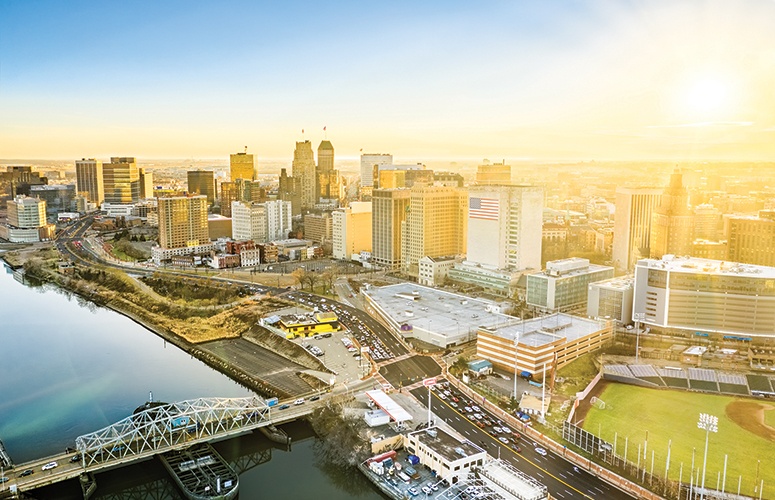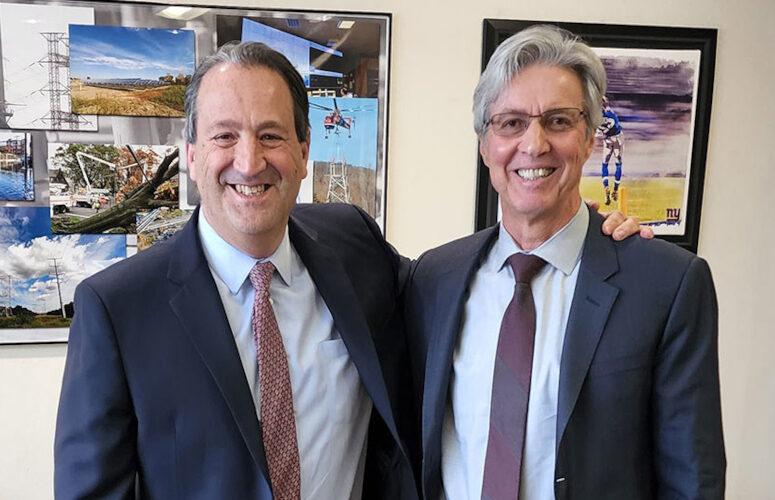
Opportunity for All
As business community thrives, Newark’s leaders work collaboratively to create equitable opportunities for all city stakeholders.
By Vince Baglivo, Contributing Writer On Sep 13, 2019The changes are dramatic, and growing day by day. Newark’s downtown is being transformed by an influx of investment, ideas and innovation that are changing the conversation about what the city can and should be. Distinctive development projects, both commercial and residential, are creating new communities in the heart of the city. Mulberry Commons, linking Newark’s downtown and Ironbound, has introduced an inviting, green corridor that planners hope will extend to the riverfront on the Passaic, adding to quality of life and attracting new businesses and residents.
Yet, many who have supported and contributed to efforts focused on revitalizing New Jersey’s largest city share a broader vision for what defines Newark’s success. They believe that until all wards of the city are benefiting from and participating in this renaissance, the city has not reached its full potential.
“We are trying to determine how we can ensure the city grows in an equitable and inclusive way,” Aisha Glover, CEO of the Newark Alliance, says. “If you don’t combine economic and community development approaches, you don’t understand the vision for Newark,” she adds.
Glover credits the leadership of Mayor Ras J. Baraka for making this a rallying cry for those who want to be a part of a transformative process. In 2017, Mayor Baraka, joined by the leaders of Newark’s premiere corporations, social justice, community development, and educational institutions, announced a landmark initiative designed to strengthen the city’s economy.
Called “Hire. Buy. Live. Newark,” the initiative combines three interrelated strategies: Newark 2020, which will connect 2020 unemployed city residents to full-time living wage jobs by the year 2020; Buy Newark, which supports the growth of local businesses by matching them to the purchasing needs of other Newark businesses; and Live Newark, to attract more employees, faculty and students to live in the city and provide existing residents with additional rental and homeownership choices and incentives.
To support the program’s mission, Newark 2020 partners have each committed to hiring a specific number of Newark residents by 2020. But preparing those individuals as competitive candidates for employment so they receive fair consideration for positions in each industry is a critical component of the program’s success.
The Newark Alliance, a program partner, has also focused on workforce development and training programs designed to equip participants with the skills they need to fill positions identified by other partners and employers in areas like healthcare, transportation, distribution and logistics.
Through the Alliance’s CareerWorks Collaborative, more than 1,000 jobseekers have been trained since its launch in 2011. One of only 32 similar regional collaboratives in the country, it supports workforce partnerships focused on meeting the needs of both employers in high growth/high wage industries and low-income workers. CareerWorks has been instrumental in helping more than 80% of program participants advance along sustainable career pathways.
Bernel Hall, president and CEO of the Newark Community Economic Development Corporation (NCEDC), says his agency is trying to parallel what’s happening with the expansion of Fortune 1000 businesses in Newark with neighborhood based economic development. By eliminating barriers to growth, through educational programs, training and business development initiatives, Hall believes the city can help create local millionaires, improve home ownership rates and spur local investment.
NCEDC partnered with the city and TD Bank to host an eight-week class entitled “The Language of Capital” to teach city business owners the skills they need to succeed. The classes, which began in July, are designed to enable business owners to understand how to manage their personal and business finances and credit, learn how to assess their financial needs, what it takes to become and remain profitable, how to conduct a market and competition analysis, and how to capture their story in a business plan.
“Statistics prove that local entrepreneurs hire local, shop local, and live local,” Hall notes. NCEDC also joined with the City of Newark to present a Business Certification Expo at Rutgers Business School where Newark businesses were updated on different bidding opportunities with city, county, state and tri-state entities, and then had the ability to apply for certifications with each entity.
The purpose of the full day event was to ensure Newark-based businesses are competing for RFPs to be able to help grow their businesses.
Newark business owners applied for certifications and competed for RFPs and bids from the City of Newark, County of Essex, State of New Jersey, the Port Authority of NY & NJ, NYC Small Business Services and the NY & NJ Minority Supplier Development Council. Options for business certifications included Minority Business Enterprise (MBE), Women Business Enterprise (WBE), Minority & Women Business Enterprise (MWBE), Disadvantaged Business Enterprise (DBE), Small Business Enterprise (SBE) and Disabled/Veteran Owned Business (D/VOB).
Robert Johnson, chief diversity officer at Gibbons, says that many qualified students of diverse backgrounds may be the first in their family to attend law school. As graduates, they have credentials and skills, but often lack connections to pursue opportunities in their field. He sees his role, and that of other diversity officers, as helping to attract, recruit and retain minority attorneys. “If it’s not a core issue for a firm, it can easily be overlooked,” Johnson adds.
Johnson highlights Gibbon’s Clerkship to Associate Pipeline (CAP) Program as an example of the firm’s proactive diversity initiatives. Each spring and fall, CAP, launched in 2018 and led by Johnson, assists highly qualified students of diverse backgrounds, selected by participating faculty and administrators of three area law schools (Rutgers-Newark, Rutgers-Camden, and Seton Hall), to prepare for post-law school employment.
Through Gibbons Cares, the firm’s dedicated community outreach and pro bono program, Gibbons donates more than $1 million annually, as well as provides extensive volunteer service and pro bono legal representation. A notable example is the Gibbons Expungement Clinic, where the firm partners with Volunteer Lawyers for Justice (VLJ), a local nonprofit that provides free legal services for economically disadvantaged people, to host a clinic once a month at Gibbons Newark. Gibbons attorneys help clients with prior nonviolent criminal convictions have those charges expunged from their records, better positioning them for future employment, housing and other opportunities. The Expungement Clinic also helps clients referred by VLJ’s ReLeSe program, which aids clients reentering society after completing prison sentences.
McCarter & English has been supporting its hometown of Newark for more than 170 years. The firm’s lawyers dedicate tens of thousands of hours each year to assisting numerous people, organizations and causes. McCarter & English received the American Bar Association’s 2019 Pro Bono Publico Award in recognition of that work.
The firm embraces a definition of inclusion that encompasses all talented professionals, regardless of race, ethnicity, religion, gender, gender identity, sexual orientation, or physical ability, to create paths for long-term success and, ultimately, a strong organization that reflects the vibrant communities it serves.
McCarter’s Diversity & Inclusion Partner, Moy Ogilvie, oversees and coordinates the firm’s diversity efforts and leads a 15-member Diversity & Inclusion Committee, which comprises partners and staff from nine offices plus firm-wide managing partner, Joe Boccassini.
“Diverse perspectives make us stronger,” Boccassini says. “As a firm, we recognize that diversity is essential to progress, and so we are deeply committed to ensuring that McCarter remains a place where everyone can succeed.”
McCarter’s firm-wide pro bono program spans the full range of unmet legal need. Its service to tenants facing eviction grew exponentially in 2018 as the firm built out services in response to community needs. McCarter & English created the first-of-its-kind Pro Bono Fellowship for the City of Newark, a full-time attorney position dedicated to assisting the overwhelming number of low-income tenants facing eviction.
Other members of Newark’s corporate community are making a difference as well. Daryl Shore, Prudential’s director of inclusive communities, notes that Prudential is a purpose-driven company, and nowhere is that purpose more evident than in its hometown of Newark.
“While other companies left during challenging times, Prudential remained and continues to make long-term investments in the city because we know meaningful change takes time,” Shore points out. “We have been part of the fabric of Newark for more than 140 years. During that time, we have committed billions of dollars to support economic and social opportunity across the entire city.
“In the last decade alone, Prudential has committed more than $1 billion to Newark through impact investments, grants, and employee time,” Shore continues. “We know that economic growth in cities brings vibrancy and opportunity, and that often those opportunities aren’t accessible to all city residents equally. ”In 2016, Prudential engaged six anchor partners (New Jersey Performing Arts Center, Rutgers University-Newark, Audible, RWJBarnabas Health, New Jersey Institute of Technology, and Rutgers Biomedical Health Sciences) to form a Newark Anchor Collaborative. Together, these anchor partners have committed to leveraging their organizational assets and business capabilities to help drive inclusive economic growth.
Prudential has also partnered with the mayor to ensure the city’s residents can benefit from increased growth as Newark’s physical redevelopment takes root. The Newark Anchor Collaborative is helping to drive the Hire. Buy. Live. Newark strategy. As part of the Newark Alliance’s Live Local program, full-time employees in Newark (or municipalities that share a contiguous border with Newark) are eligible for up to $4,000 in rental incentives if they live in or move to an apartment in Newark (within the designated Program Incentive Area). For homeowners, there is up to $7,000 in exterior improvement incentives. The Live Local program was launched as a one-year pilot incentive on March 11, 2019 and will be reviewed for potential renewal after a 12 month period.
Maria Spina, PSEG Foundation program manager, says Newark is more than the company’s headquarters. “It’s our hometown. That’s why we are passionate about supporting and investing in the economic, educational and workforce development of our city as we aim to build thriving and sustainable communities here and across the state,” Spina adds.
Examples of organizations and programs supported by the PSEG Foundation include Per Scholas, a national nonprofit with a mission to open doors to technology careers for individuals from overlooked communities. As Major Founding Partner, the PSEG Foundation’s funding to Per Scholas will help support operations at a new training site in Newark that will allow the organization to make a sustained commitment to the Newark community and prepare 275 residents for successful tech careers by 2021.
The PSEG Foundation is also the supporter of the Newark Summer Youth Employment Program (NSYEP). The NSYEP is managed by the Newark Youth One Stop, the city’s lead workforce agency, and relies on many partnerships with community organizations to assist with training and providing youth with a diverse experience. The program seeks to offer economic opportunity for youth providing those critical skills and experiences in youth development, workforce skills and financial literacy.
Michellene Davis, Esq., executive vice president, chief corporate affairs officer, says RWJBarnabas Health’s Newark Beth Israel Medical Center has been proactively involved in community health and wellness initiatives for more than 119 years. “We are immersed both internally and externally since many of our employees are Newark residents,” Davis adds.
The Beth Challenge began as a small weight loss contest modeled after television’s The Biggest Loser and quickly evolved into a sustainable nutrition and exercise program that has helped employees and the community lose thousands of collective pounds. Today, The Beth Challenge is offered in houses of worship, schools, government offices, and to the Newark Fire and Police Departments and first responders. Newark Beth Israel Medical Center’s signature health fair events – The Alma Beatty Health and Wellness Fair and The Ray Murphy Men’s Health and Wellness Night – reach hundreds of Newark residents with important health information and health screenings including sleep consultations, training in hand-compression CPR, hernia screenings, and exercise instruction.
The Beth Greenhouse was started as a farmer’s market to help counter the food desert/food swamp conditions of the South Ward community surrounding the hospital. A combination of limited access to affordable, fresh and nutritious food plus a preponderance of food outlets offering little to no healthy food options was impacting local health and wellness.
Additionally, RWJBarnabas has partnered with City Green and the Garden State Good Food Network to support Double Bucks, a nutrition incentive program that allows recipients of WIC and SNAP benefits to use their federal food benefit dollars to purchase locally grown produce from the Beth Greenhouse. Not only can recipients use their WIC and SNAP dollars to buy delicious local produce, but City Green doubles the value of those dollars, allowing recipients to purchase twice as much food as they could normally buy at the grocery store. This program creates a direct incentive for residents to spend their benefits on healthier local food choices.
Davis believes RWJBarnabas’ grassroots to grass tops approach is a step forward in delivering health and wellness programs, with no options off the table, and local input and ideas vitally important contributions to the process of co-designing programs needed where people live and work.
While institutions such as RWJBarnabas are tending to the healthcare needs of the Newark community, institutions such as the New Jersey Performing Arts Center (NJPAC) are tending the cultural health of city residents.
According to David D. Rodriguez, executive vice president and executive producer for NJPAC, the center spends more than $7 million a year on arts education. “We have more than 80 partners, between churches and community centers, around the entire state, a third of which are in Newark. We are almost in every single New Jersey county and we are in every Newark school,” Rodriguez explains.
NJPAC is one of the five busiest performing arts centers in the country and its strength is its diverse programming, Rodriguez says, adding, “We have doubled our audiences over the past five years and have added more urban, Latino, Indian and South Korean programming.”
With diverse professional artists and performers giving their time to educate students through NJPAC’s various programs, Rodriguez says the effect is that “young people get a chance to see people of achievement who look like them. Additionally, the artists remember NJPAC and Newark because of the young people. It’s not just another date on a tour for them.”
He concludes, “I don’t think there is a more exciting place to work right now than Newark.”
To access more business news, visit NJB News Now.
Related Articles:





